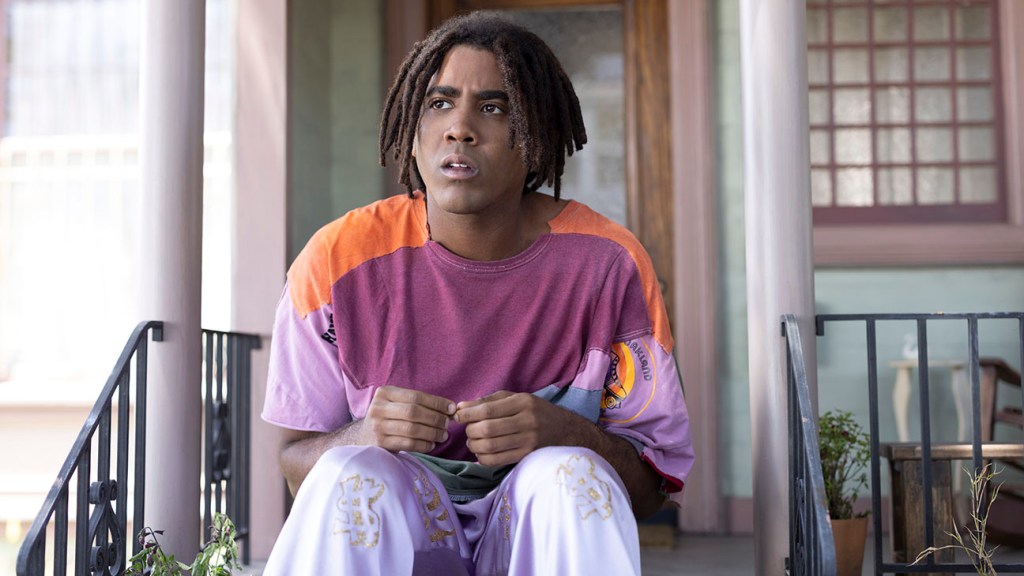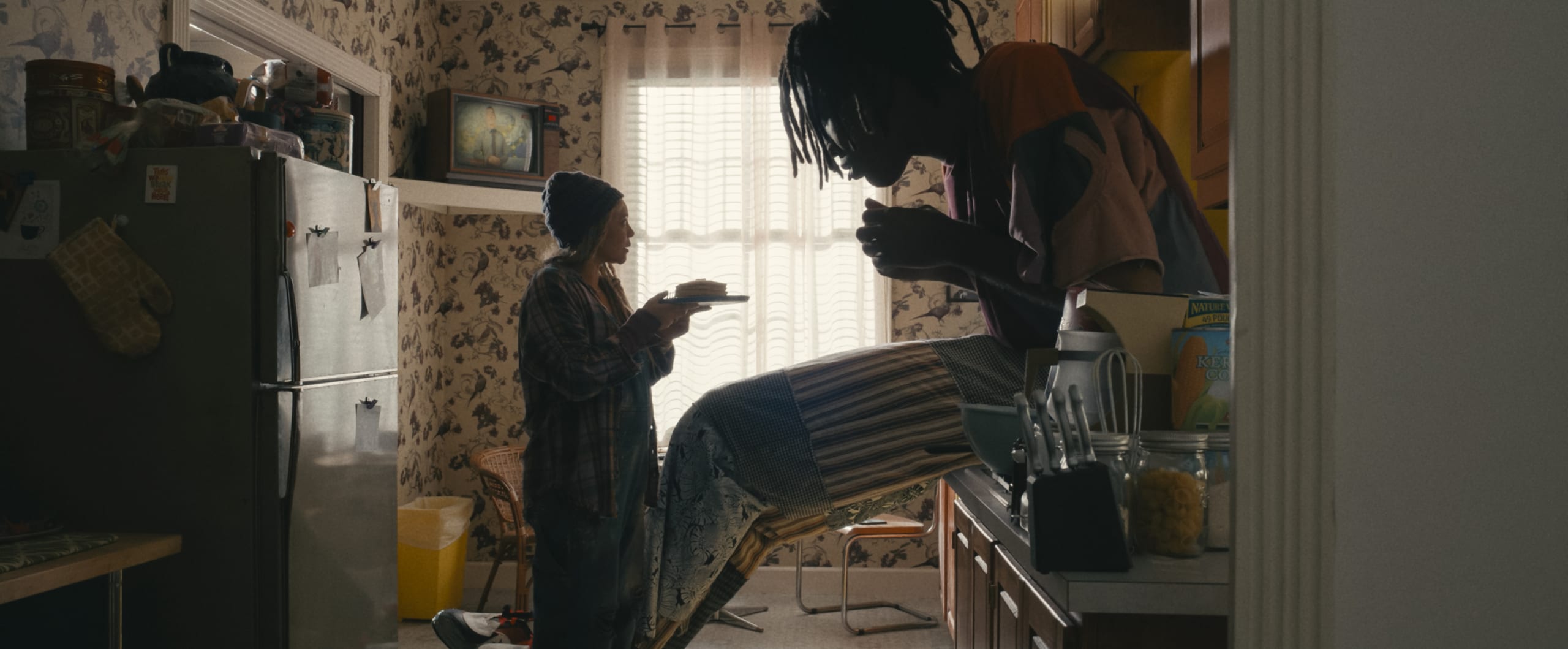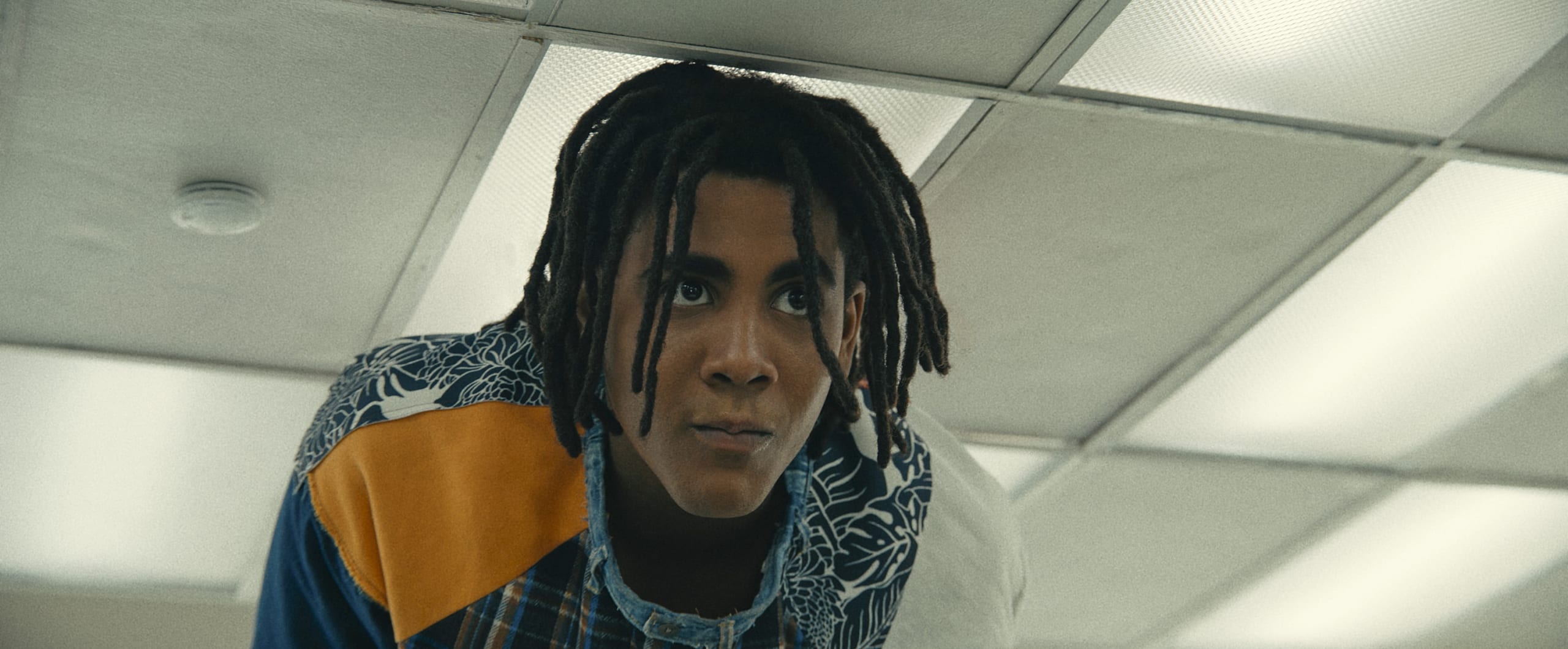Debuts tomorrow.
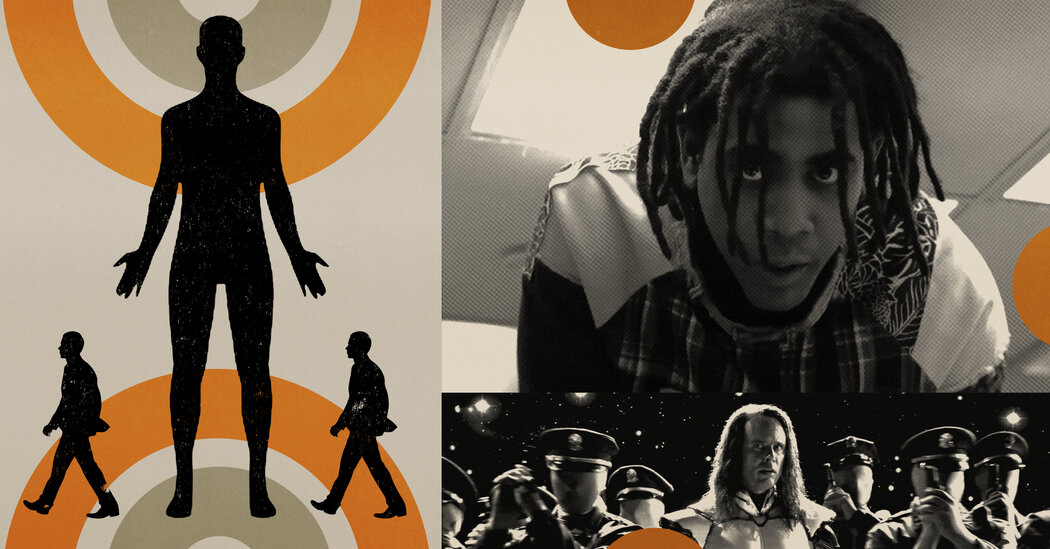
 www.nytimes.com
www.nytimes.com
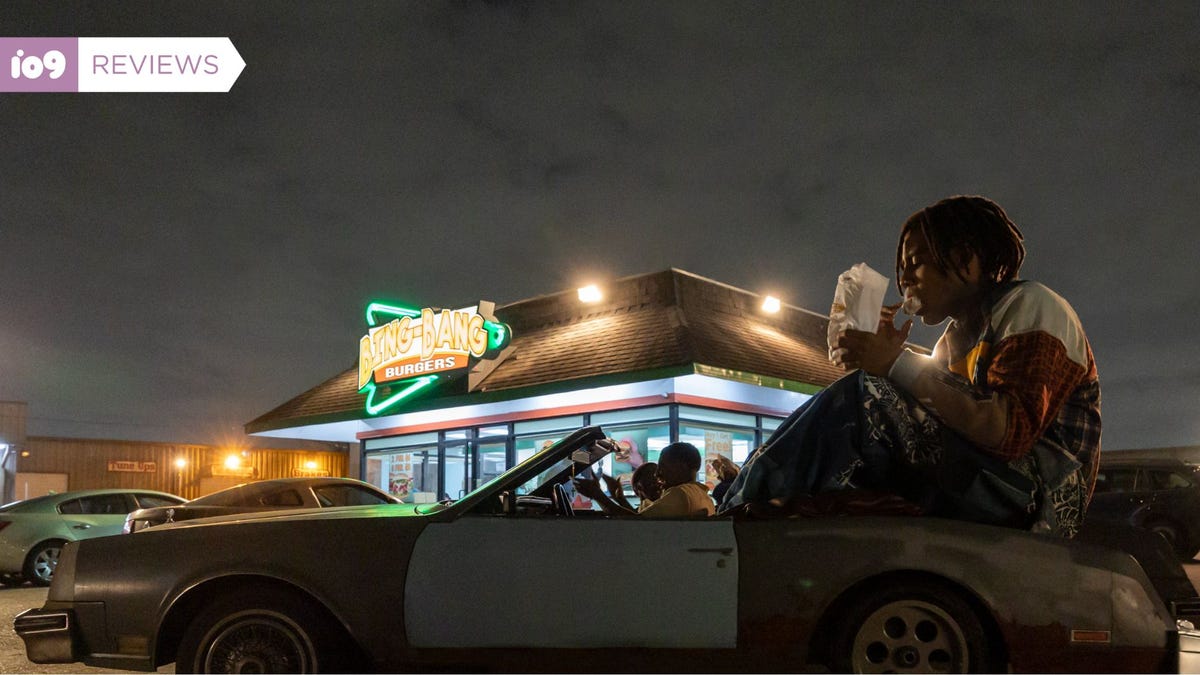
 gizmodo.com
gizmodo.com
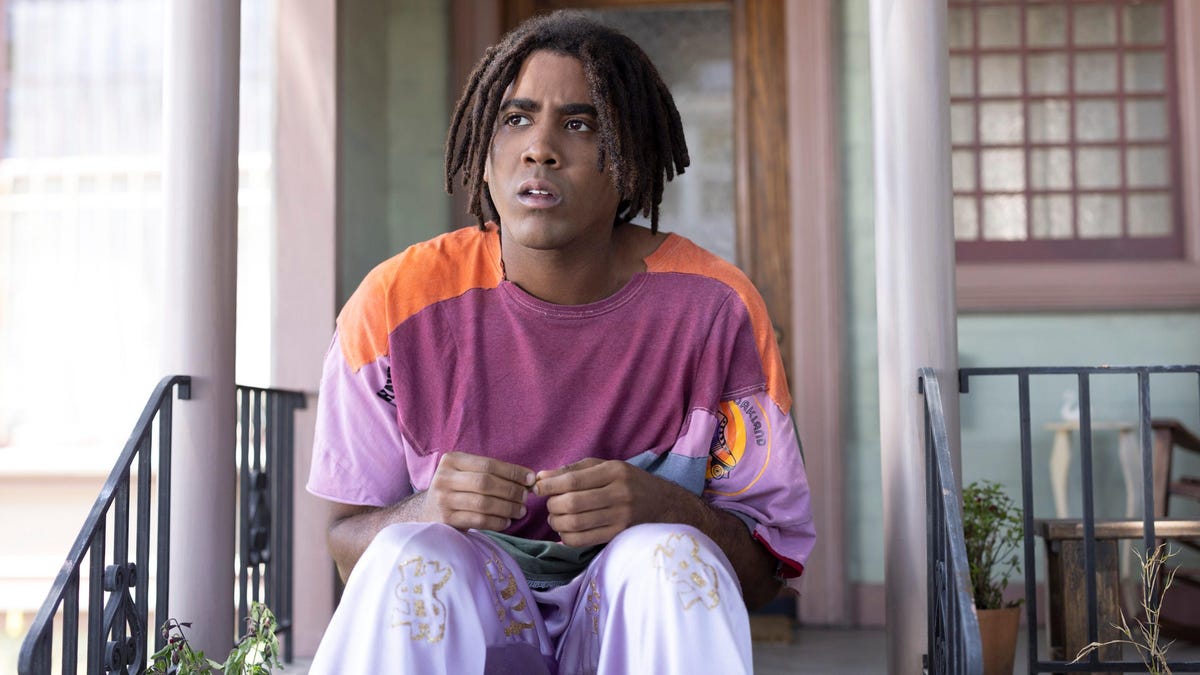
 www.avclub.com
www.avclub.com
Brobdingnag is somewhere in the Pacific Northwest. On the map included in Volume II of his 1726 satire “Gulliver’s Travels,” Jonathan Swift depicts it as an enormous peninsula somewhere north of California. Brobdingnag is the land of the giants: When Gulliver is shipwrecked there, he finds a race of people nearly 60 feet tall, wise and moral, repulsed by his descriptions of a venal and warlike British society. The West Coast no longer teems with such gentle giants, but according to the writer, director and musician Boots Riley, there remains one well south of Brobdingnag, near the spot Swift designates P. Monterey — there’s a giant living in Oakland, Calif.
Riley’s new Amazon Prime series, “I’m a Virgo,” is a Swiftian fable by way of Charles Dickens, Ralph Ellison, Alan Moore and Spike Lee. It is, centrally, the tale of Cootie, a once-in-a-generation giant who becomes both a folk hero and a public enemy. As someone tells him in an early episode, “People are always afraid, and you’re a 13-foot-tall Black man.” Cootie’s adoptive parents keep him as sheltered as they can; he grows up watching the action on his block via a periscope. He’s a learned giant — his father requires him to read 10 hours a day — but he’s also electrified by screens, parroting lines from his favorite reality-TV shows. (His mantra — “from that day forward, I knew nothing would stop me from achieving greatness” — is a quote from a “Bachelorette”-style program.) His parents, trying to persuade him to stay in the safety of the two-story apartment they’ve built, show him a scrapbook of giants throughout history, many Black, enslaved or lynched for their gigantism; he will, they clearly fear, be a too-visible man, a projection screen for the fears and desires of others. (This is not a fate reserved for giants alone.) But when Cootie finally leaves the house as a teenager, he falls in love with this world, in all its sublimity and stupidity. Hearing bass for the first time, thumping from a new friend’s trunk, he becomes an angry poet: “It moves through your body like waves,” he tells his parents. “And it sings to your bones.”
Riley’s Oakland, like Swift’s own West Coast, is rendered surreal by allegory. It has a housing crisis, police violence and rolling blackouts, but it also has a community of people who shrink to Lilliputian pocket size (they wear receipts for clothes) and a fast-food worker named Flora who can work at a Flash-like hyperspeed. There’s also a rogue white comics artist called the Hero who exacts vigilante justice on his largely Black neighbors — but even the idea of the fascistic law-and-order superhero seems pedestrian here. This show is not subtle about its vision or its allegories. “As a young Black man,” Cootie says, repeating his parents’ warnings, “if you walk down the street, and the police see that you don’t have a job, they send you directly to jail.” His new friends all laugh at his credulousness until one replies, “Metaphorically, that’s how it goes.”
One of Cootie’s first rebellions is his insistence on trying a Bing Bang Burger, whose comically unappealing commercials he sees constantly on TV. We’re shown slack-jawed observers making videos before we see Cootie himself, standing in line, hunched over, his back pressed against the fluorescent lights of the burger joint. The actor Jharrel Jerome shows us Cootie’s trepidation by always playing him small, tilting his head against his shoulder, collapsing his frame inward, his lips in an expectant pucker. But when he sees Flora, assembling burgers with blurry speed, there’s a moment of connection. Cootie expands as she hands him his order and calls him “big man.” He bumps into the exit sign on the way out.
“I’m a Virgo” comes on the heels of a few ingenious experiments in TV surrealism, from “Atlanta” to “Undone” to the recent farce “Mrs. Davis.” Perhaps Amazon and Riley were emboldened by these examples or energized by the idea of transcending them, because this series has the courage of its confabulations. Its fantastical concept works in metaphor just the same way it works in fact, as it reminds us with proud bluntness. Drunk in the club, Cootie waxes poetic to his friend Felix: “Friends,” he says, “can help you feel the inside of yourself and the rest of the world at the same time.” Felix takes a minute to soak that in before he nods his head and responds, more or less, “Hey, bruh, that’s real.”
Premium cable networks and streamers have long built their brands around boundary-pushing and risk, even as their prestige series often settle into safe, predictable formulas. Then there are properties like the ever-expanding Marvel Universe, which might once have used superheroes to dramatize truths about our own world but has now disappeared into its own multiverses, swallowed up by digital battles and green-screen vistas. “I’m a Virgo” is a visual and ideological counterpoint to all this. It uses the conceit of a 13-foot-tall Black man to reach for insights about race, class and injustice, and it is fastidiously, hilariously committed to the bit, constantly doubling down on the logistics of Cootie’s bigness. Plenty of series mess around with television’s narrative structures or genre conventions, but this show is willing to break the most basic visual conventions of how you put humans together onscreen.
And so Cootie has to be as real as television can make him. Most of his scenes are filmed using elaborate forced-perspective shots and scale models, not green screens or CGI. You can feel the difference. Cootie tends to look as if the walls are closing in, because they are. The show’s ramshackle, claustrophobic genius can be thrilling. I remember being stunned watching Christopher Nolan depict the depths of a wormhole using only practical effects; my awe was not dissimilar watching Boots Riley figure out how to shoot a slapstick, ultimately pretty sexy love scene between a normal-size woman and a 13-foot-tall man without leaning on digital effects for every frame. We see Flora and Cootie largely in close-ups, Flora centered neatly in her frame while Cootie fills his to the edges. There are occasional two-shots that use dolls as stand-ins, but mostly the scene uses sound to keep the actors in contact. The scene occupies nearly half its episode, as they work to figure out how their act of love can even be consummated, and Riley figures how to show it to us, and we learn how to see it — but it’s sweet, not leering. Usually, in Riley’s frame, the giant man is the real thing, and the world around him is either distorted or built anew. With Flora, whose own strangeness the show also honors and protects, the world reimagines itself in relation to the giant.
The visual gags exist alongside other spectacular fantasies. One of Cootie’s friends organizes a general strike to protest the inequities of the health care system. There’s a guerrilla attack on a power plant. A vigilante cop is converted to communism. (What’s a wilder pitch: that the power of argument persuades a law-and-order ideologue to abandon carceral capitalism or that one kid in Oakland turns out to be really, really tall?) Riley, himself an avowed communist, has always been an unabashedly political artist, but what’s radical here isn’t the politics alone; it’s what the politics free the show to do. “I’m a Virgo” makes the idea of tearing up systems of power feel less destructive than boundless, and it does this by tethering its political vision to a revolution in the way we see human bodies onscreen. Its narrative feels almost spontaneous, teeming with strange and unexpected life. Riley has made his radicalism feel verdant, generative, self-sustaining. In the land of the only living giant, that’s real.

Meet TV’s 13-Foot-Tall Man
The giant teenager in Boots Riley’s new series, “I’m a Virgo” is among television’s boldest moves in a while.

Boots Riley Delivers Surreal, Heartfelt Hilarity in I'm a Virgo
The Prime Video series would be even funnier if it wasn't a scathingly real dose of the world we live in.
 gizmodo.com
gizmodo.com

I’m A Virgo review: Boots Riley makes a wonderfully weird TV show
The mind behind Sorry To Bother You cooks up a freewheeling, ultra-stylized series for Prime Video.
 www.avclub.com
www.avclub.com
Meet TV’s 13-Foot-Tall Man
The giant teenager in Boots Riley’s new series, “I’m a Virgo” is among television’s boldest moves in a while.Brobdingnag is somewhere in the Pacific Northwest. On the map included in Volume II of his 1726 satire “Gulliver’s Travels,” Jonathan Swift depicts it as an enormous peninsula somewhere north of California. Brobdingnag is the land of the giants: When Gulliver is shipwrecked there, he finds a race of people nearly 60 feet tall, wise and moral, repulsed by his descriptions of a venal and warlike British society. The West Coast no longer teems with such gentle giants, but according to the writer, director and musician Boots Riley, there remains one well south of Brobdingnag, near the spot Swift designates P. Monterey — there’s a giant living in Oakland, Calif.
Riley’s new Amazon Prime series, “I’m a Virgo,” is a Swiftian fable by way of Charles Dickens, Ralph Ellison, Alan Moore and Spike Lee. It is, centrally, the tale of Cootie, a once-in-a-generation giant who becomes both a folk hero and a public enemy. As someone tells him in an early episode, “People are always afraid, and you’re a 13-foot-tall Black man.” Cootie’s adoptive parents keep him as sheltered as they can; he grows up watching the action on his block via a periscope. He’s a learned giant — his father requires him to read 10 hours a day — but he’s also electrified by screens, parroting lines from his favorite reality-TV shows. (His mantra — “from that day forward, I knew nothing would stop me from achieving greatness” — is a quote from a “Bachelorette”-style program.) His parents, trying to persuade him to stay in the safety of the two-story apartment they’ve built, show him a scrapbook of giants throughout history, many Black, enslaved or lynched for their gigantism; he will, they clearly fear, be a too-visible man, a projection screen for the fears and desires of others. (This is not a fate reserved for giants alone.) But when Cootie finally leaves the house as a teenager, he falls in love with this world, in all its sublimity and stupidity. Hearing bass for the first time, thumping from a new friend’s trunk, he becomes an angry poet: “It moves through your body like waves,” he tells his parents. “And it sings to your bones.”
Riley’s Oakland, like Swift’s own West Coast, is rendered surreal by allegory. It has a housing crisis, police violence and rolling blackouts, but it also has a community of people who shrink to Lilliputian pocket size (they wear receipts for clothes) and a fast-food worker named Flora who can work at a Flash-like hyperspeed. There’s also a rogue white comics artist called the Hero who exacts vigilante justice on his largely Black neighbors — but even the idea of the fascistic law-and-order superhero seems pedestrian here. This show is not subtle about its vision or its allegories. “As a young Black man,” Cootie says, repeating his parents’ warnings, “if you walk down the street, and the police see that you don’t have a job, they send you directly to jail.” His new friends all laugh at his credulousness until one replies, “Metaphorically, that’s how it goes.”
One of Cootie’s first rebellions is his insistence on trying a Bing Bang Burger, whose comically unappealing commercials he sees constantly on TV. We’re shown slack-jawed observers making videos before we see Cootie himself, standing in line, hunched over, his back pressed against the fluorescent lights of the burger joint. The actor Jharrel Jerome shows us Cootie’s trepidation by always playing him small, tilting his head against his shoulder, collapsing his frame inward, his lips in an expectant pucker. But when he sees Flora, assembling burgers with blurry speed, there’s a moment of connection. Cootie expands as she hands him his order and calls him “big man.” He bumps into the exit sign on the way out.
“I’m a Virgo” comes on the heels of a few ingenious experiments in TV surrealism, from “Atlanta” to “Undone” to the recent farce “Mrs. Davis.” Perhaps Amazon and Riley were emboldened by these examples or energized by the idea of transcending them, because this series has the courage of its confabulations. Its fantastical concept works in metaphor just the same way it works in fact, as it reminds us with proud bluntness. Drunk in the club, Cootie waxes poetic to his friend Felix: “Friends,” he says, “can help you feel the inside of yourself and the rest of the world at the same time.” Felix takes a minute to soak that in before he nods his head and responds, more or less, “Hey, bruh, that’s real.”
Premium cable networks and streamers have long built their brands around boundary-pushing and risk, even as their prestige series often settle into safe, predictable formulas. Then there are properties like the ever-expanding Marvel Universe, which might once have used superheroes to dramatize truths about our own world but has now disappeared into its own multiverses, swallowed up by digital battles and green-screen vistas. “I’m a Virgo” is a visual and ideological counterpoint to all this. It uses the conceit of a 13-foot-tall Black man to reach for insights about race, class and injustice, and it is fastidiously, hilariously committed to the bit, constantly doubling down on the logistics of Cootie’s bigness. Plenty of series mess around with television’s narrative structures or genre conventions, but this show is willing to break the most basic visual conventions of how you put humans together onscreen.
And so Cootie has to be as real as television can make him. Most of his scenes are filmed using elaborate forced-perspective shots and scale models, not green screens or CGI. You can feel the difference. Cootie tends to look as if the walls are closing in, because they are. The show’s ramshackle, claustrophobic genius can be thrilling. I remember being stunned watching Christopher Nolan depict the depths of a wormhole using only practical effects; my awe was not dissimilar watching Boots Riley figure out how to shoot a slapstick, ultimately pretty sexy love scene between a normal-size woman and a 13-foot-tall man without leaning on digital effects for every frame. We see Flora and Cootie largely in close-ups, Flora centered neatly in her frame while Cootie fills his to the edges. There are occasional two-shots that use dolls as stand-ins, but mostly the scene uses sound to keep the actors in contact. The scene occupies nearly half its episode, as they work to figure out how their act of love can even be consummated, and Riley figures how to show it to us, and we learn how to see it — but it’s sweet, not leering. Usually, in Riley’s frame, the giant man is the real thing, and the world around him is either distorted or built anew. With Flora, whose own strangeness the show also honors and protects, the world reimagines itself in relation to the giant.
The visual gags exist alongside other spectacular fantasies. One of Cootie’s friends organizes a general strike to protest the inequities of the health care system. There’s a guerrilla attack on a power plant. A vigilante cop is converted to communism. (What’s a wilder pitch: that the power of argument persuades a law-and-order ideologue to abandon carceral capitalism or that one kid in Oakland turns out to be really, really tall?) Riley, himself an avowed communist, has always been an unabashedly political artist, but what’s radical here isn’t the politics alone; it’s what the politics free the show to do. “I’m a Virgo” makes the idea of tearing up systems of power feel less destructive than boundless, and it does this by tethering its political vision to a revolution in the way we see human bodies onscreen. Its narrative feels almost spontaneous, teeming with strange and unexpected life. Riley has made his radicalism feel verdant, generative, self-sustaining. In the land of the only living giant, that’s real.


